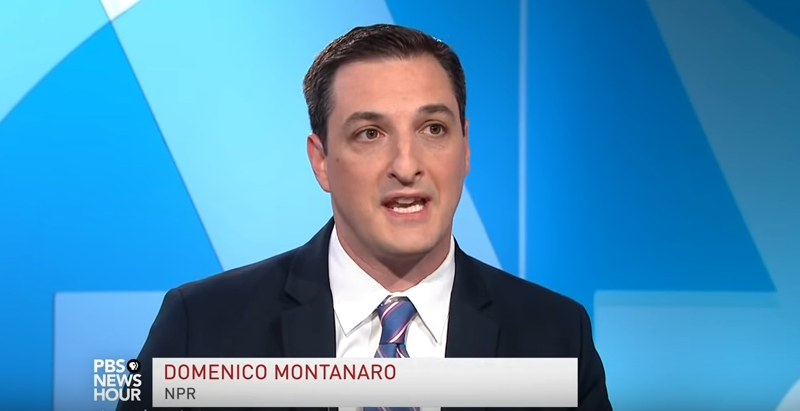If National Public Radio political editor Domenico Montanaro is wondering why he's getting the cold shoulder at work these days, this might explain it.
Montanaro was one of four journalists to appear on the NPR Politics podcast for a weekly roundup segment on Feb. 8 when the subject of the Jan. 20-22 government shutdown came up, a showdown prompted by bitter divisions in Congress over the immigration policy known as DACA (Deferred Action for Childhood Arrivals).
Here's what Montanaro said after a clip was played of House Speaker Paul Ryan saying both major parties possess a "real commitment" to solving the "DACA challenge" --
NPR White House reporter Tamara Keith: Kelsey, can you translate that at all? (laughs)
NPR congressional reporter Kelsey Snell: Uh, he says that he's committed to getting something done. That is a little bit further than he's gone in the past but for Democrats that's not enough. They want the same kind of firm commitment that (Senate Majority Leader Mitch) McConnell gave and what Ryan did there is just not that.
MONTANARO: Now, big picture here, Chuck Schumer and Democrats shut the government down not too long ago over DACA and it didn't work out so well for Democrats. Not only did they not get anything out of this, but they were almost evenly blamed for the government shutdown and President Trump this time around is saying, hey, if this is going to be over DACA, let it shut down.
Alas, all good things must eventually end, such as the two decade-plus run of one of the major narratives in the media, namely, that Republicans are always to blame for government shutdowns. This was inevitably coupled with media commentary that Republicans doing this was yet further evidence of their nihilistic hatred of government and indifference to the suffering of people dependent on the state. This time around it was obvious to all but the most delusional leftist that it was Democrats forcing a shutdown as they underestimated the public's demand for border security and misread public sympathy for illegal immigrants.
This time around it was obvious to all but the most delusional leftist that it was Democrats forcing a shutdown as they underestimated the public's demand for border security and misread public sympathy for illegal immigrants.
Notice how Montanaro backpedals, however, after that clumsy double negative -- "Not only did (Democrats) not get anything out of this" -- right before he asserts they were "almost evenly blamed" for the shutdown. In other words -- Pay no attention to what I just said, it's Republicans who are more to blame!
This wasn't the only comical moment from Montanaro in the podcast. Another came during a discussion of President Trump's proposal for a military parade in Washington similar to one he saw in Paris on Bastille Day. Tamara Keith said she called historian Michael Beschloss to get his take, and this was followed by Montanaro providing his unique take on Ike --
BESCHLOSS: In the 1950s when Dwight Eisenhower was president there were big parades in Moscow past Lenin's tomb in Red Square. They'd roll the tanks through and bombers would fly overhead and the leader, in that case Nikita Khrushchev, would stand on Lenin's tomb and the idea was to show Soviet might. Back at the White House some of Dwight Eisenhower's people went to him and said, well, maybe we should have some parades like that in Washington or elsewhere to show American might and Eisenhower, who didn't need his credentials to be questions (sic), he was the hero of course of D-Day, Eisenhower said absolutely not. We, the United States, are seeking peace. We are the preeminent power on earth. For us to try to imitate what the Soviets are doing in Red Square would make us look weak.
MONTANARO: And Eisenhower was a general. He conquered Europe.
No, that was actually Hitler who conquered Europe -- followed by Eisenhower as Supreme Allied Commander and our western allies liberating Europe, or at least Western Europe. As World War II drew to a close, Nazi terror across Eastern Europe was replaced by Soviet tyranny that lasted for another half century, until Soviet-bloc nations were liberated, this time by Reagan's victory in the Cold War.
It also rings hollow to describe Eisenhower as the "hero" of D-Day, an honorific he'd surely reject. The real heroes were the men storming the beaches and jumping from planes, and thousands of them never came home.




